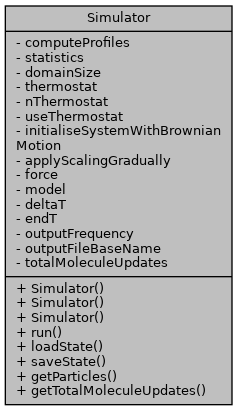This class implements the simulation of the particle system. More...
#include <Simulator.h>

Public Member Functions | |
| Simulator ()=delete | |
| Simulator (SimulationSettings &simulationSettings, FileHandler::outputFormat outputFormat) | |
| Constructor to contruct a new simulation evironment. More... | |
| Simulator (DirectSumSimulationParameters ¶meters, std::string &inputFilePath, FileHandler::outputFormat outputFormat, int outputFrequency, std::string &outputFileBaseName) | |
| Legacy constructor to construct a new simulation environment using the direct sum algorithm. More... | |
| void | run (bool benchmark) |
| Run the simulation. More... | |
| void | loadState (std::string &pathToMolecules) |
| Load the state of all molecules from a previous simulation back into this simulation. More... | |
| void | saveState () |
| Export the current state of all molecules to a txt file for using them in a new simulation. More... | |
| ParticleContainer & | getParticles () |
| Get the Particle container of this simulator. More... | |
| unsigned long long | getTotalMoleculeUpdates () const |
Private Attributes | |
| bool | computeProfiles |
| std::unique_ptr< Statistics > | statistics |
| std::array< double, 3 > | domainSize {} |
| std::unique_ptr< Thermostat > | thermostat |
| int | nThermostat |
| bool | useThermostat |
| bool | initialiseSystemWithBrownianMotion |
| bool | applyScalingGradually |
| std::unique_ptr< Force > | force |
| std::unique_ptr< Model > | model |
| double | deltaT |
| double | endT |
| int | outputFrequency |
| std::string | outputFileBaseName |
| unsigned long long | totalMoleculeUpdates |
Detailed Description
This class implements the simulation of the particle system.
Using Newton's axioms and the Störmer-Verlet equations force, velocity and position of all particles are computed in fixed discrete time steps. Results are written to files.
Constructor & Destructor Documentation
◆ Simulator() [1/3]
|
delete |
◆ Simulator() [2/3]
| Simulator::Simulator | ( | SimulationSettings & | simulationSettings, |
| FileHandler::outputFormat | outputFormat | ||
| ) |
Constructor to contruct a new simulation evironment.
- Parameters
-
simulationSettings Specify all parameters of the simulation environment. outputFormat Format of the output files.
◆ Simulator() [3/3]
| Simulator::Simulator | ( | DirectSumSimulationParameters & | parameters, |
| std::string & | inputFilePath, | ||
| FileHandler::outputFormat | outputFormat, | ||
| int | outputFrequency, | ||
| std::string & | outputFileBaseName | ||
| ) |
Legacy constructor to construct a new simulation environment using the direct sum algorithm.
- Parameters
-
parameters Simulation parameters for the direct sum model. inputFilePath Path to the input file which comprises the particles going to be simulated. outputFormat Format of the output file. Supported formats are vtk and xyz. outputFrequency Specifies after how much time steps an output file is written. For example an output frequency of 10 means that after each 10 iterations an output file is written. outputFileBaseName Base name of the output files.
To create a new simulation environment you have to provide an input file containing the particles you want to simulate.
Member Function Documentation
◆ getParticles()
| ParticleContainer & Simulator::getParticles | ( | ) |
◆ getTotalMoleculeUpdates()
| unsigned long long Simulator::getTotalMoleculeUpdates | ( | ) | const |

◆ loadState()
| void Simulator::loadState | ( | std::string & | pathToMolecules | ) |
Load the state of all molecules from a previous simulation back into this simulation.
- Parameters
-
pathToMolecules Path pointing to the txt file which stores the state of the molecules.
◆ run()
| void Simulator::run | ( | bool | benchmark | ) |
Run the simulation.
After configuration of the parameters the simulation can be run calling this method. When no configuration is done before, the default parameters will be used.
- Parameters
-
benchmark Activate or deactivate time measurement

◆ saveState()
| void Simulator::saveState | ( | ) |
Export the current state of all molecules to a txt file for using them in a new simulation.
Member Data Documentation
◆ applyScalingGradually
|
private |
◆ computeProfiles
|
private |
◆ deltaT
|
private |
◆ domainSize
|
private |
◆ endT
|
private |
◆ force
|
private |
◆ initialiseSystemWithBrownianMotion
|
private |
◆ model
|
private |
◆ nThermostat
|
private |
◆ outputFileBaseName
|
private |
◆ outputFrequency
|
private |
◆ statistics
|
private |
◆ thermostat
|
private |
◆ totalMoleculeUpdates
|
private |
◆ useThermostat
|
private |
The documentation for this class was generated from the following files:
- /home/runner/work/MolSim/MolSim/src/moleculeSimulator/Simulator.h
- /home/runner/work/MolSim/MolSim/src/moleculeSimulator/Simulator.cpp